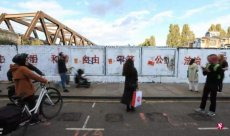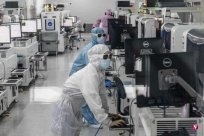I went to Zhejiang a while ago, and my friend couldn't escape a topic: economy.
Although the epidemic has passed, the Chinese economy has not rebounded sharply, but the pressure on the downlink has only increased. Even the economically developed Zhejiang is worried about how to make GDP (regional gross product) look better.A friend who worked in the development zone of the second -tier cities was bitter at the dining table. The biggest trouble at the moment is not to recruit business. There are GDP pressure on the local area.Preferential policies.
This friend shouted directly that he is now "a clever woman is difficult to cook for rice without rice." Breaking through the corporate threshold, he could not find that the business owner was willing to invest in the ground. This was very different from the fact that the company was sitting in the office a few years ago.
Another friend who worked in an enterprise took over and said, "Enterprise investment is not a faucet. (Government) opens up, (government) says that there is no money to invest, there is no money to invest, and there is money.I have to think about whether to invest, "I have been scared in recent years."
The real estate at the dining table is also determined by everyone here. The Chinese property market is more than seeking the fact that the demand is already iron. House prices must continue to fall.
China's economy has always been "southern strength and north", especially in the southeast coastal areas with developed private economy. Economic growth seems to have never been a problem.Before the epidemic, the Sino -US trade war was in full swing. After walking in the Jiangsu and Zhejiang area, he could not see the shadow of economic downturn.Although we can't talk about fatigue today, before the epidemic, the Jiangnan area is prosperous. People are full of confidence and invest in buying a house to toss the money to make money.
Since the second quarter of this year, pessimism has been shrouded in the Chinese economy.Consumption, investment, exports, and employment, almost all of the major macro data can be seen.The latest data released by the official Tuesday (August 8) gave a pot of cold water. In July, exports calculated in July fell 14.5 % year -on -year, setting the crown disease epidemic from January to February 2020 in China.The largest decline.
China has not welcomed the rise in prices as some economists predicted at the beginning of the year, and the price rose after loosening the epidemic prevention measures, but was experiencing a rare period of price decline.This is in sharp contrast to the rise in inflation after the United States and other major economic areas are open.China's industrial producer's factory price index has declined for ten consecutive months since October last year, and the consumer price index fell to zero in June.
Many people are asking, what happened to the Chinese economy?Is this a short -term cyclical fluctuation or a long -term structural recession?
Observing Chinese economists and overseas media have thrown various concepts in the past few months, trying to explain the unusual of China's economy.One statement is that China is moving towards a tightening, and the Chinese economy may tend to be "Japanese"; in May, the Economist Magazine threw another interpretation in one report. China's rise was topped.
Whether it is "Japanese economy in Japan" or "China's rise theory", it reflects the pessimism of China's economic prospects, and Beijing's recent views on these "empty" China are also particularly vigilant.Think tanks and scholars with the official background of China came out to refute one by one. In May, the Chongyang Financial Research Institute of Renmin University of China even issued a report specially to refute the "China's rise theory".The replica.
In China, Beijing has also begun to tighten the space for remarks to discuss China's economic risks.After the "Internet celebrity" economists such as Hong Yan and Wu Xiaobo were banned, the British Financial Times reported last Sunday (August 8) that Chinese officials were put pressure on economists and brokerage analysts, asking them to avoid their economy's economy on the Chinese economy.Negative trends comment.The topics of being divided into "restricted areas" include capital outflow, decline in price, tightness in currency, weak demand, downturn in the real estate industry, and so on.
Some think tanks and brokerage analysts also said that they are now under pressure to positively interpret economic news and increase public confidence.A respondent who provided consultations with the People's Bank of China stated that the official hoped that they would "interpret bad news from a positive perspective."
It is reported that this kind of pressure has prompted many economists to avoid talking about sensitive topics or start to use more euphemistically such as "Subdued Inflation" in research reports and calling with investors.
The more sensitive the topic is in the environment of Chinese public opinion, the less you can't comment at will.In private, many people are keen to discuss political issues. In public and platforms, there is no room for discussion; the environment of public opinion has narrowed in recent years, and Chinese domestic scholars and current political critics have further self -examination and avoiding political topics.In the past, economic reviews with relatively large degree of freedom have become taboos today, highlighting the sensitivity of economic problems in China at the moment, as well as officials to prevent negative public opinion impact confidence and trigger bone card effects.
The downturn in the Chinese economy is indeed the most lack of confidence at present, but where does confidence come from?Is it an analysis and comment after the news of rewarding and not worrying about worrying, or in the economic system, each individual really perceives the indicators of income, employment, price, and sales?It is true that panic emotions will affect and conduct each other. If it is not relieved, it may expand and spread; the exaggerated excessive hype also needs to be controlled, but many problems and risks.They are even more panicked.At present, the Chinese economy needs to inject confidence and restore vitality, and an environment that gets tighter and tighter will only run counter to such goals.



